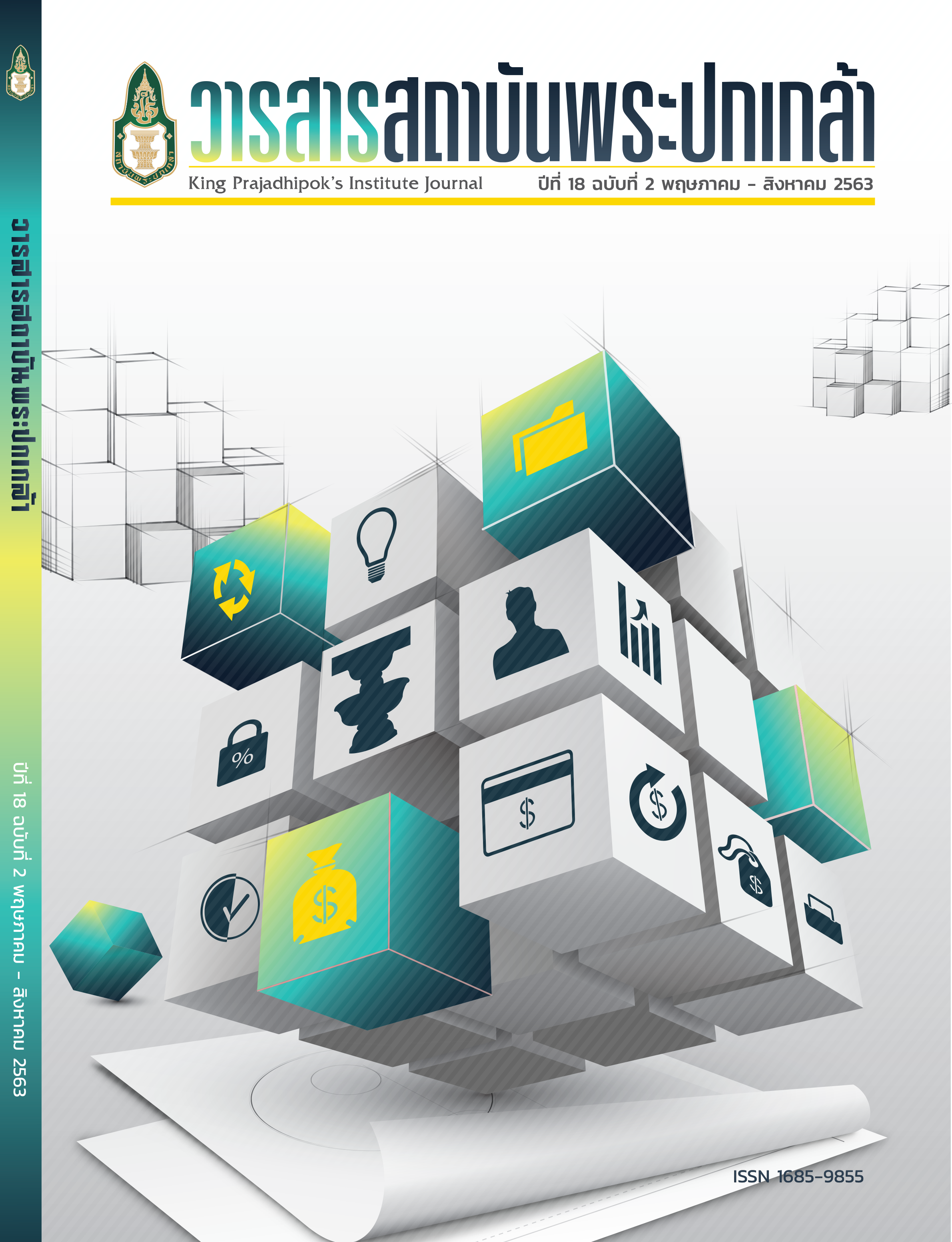Constitutional Review by the Constitutional Court as the Protector of Fundamental Rights and The Guardian of the Constitution
Main Article Content
Abstract
This article aims to study the concept of Constitutional Review and the role of the Constitutional Court as the supreme body to adjudicate on the constitutionality of laws or bills and to suggest ways to improve Thailand’s Constitutional Review system. The Research Methodology was based on qualitative technique, and field study by interview stakeholders. This Study found that for Thailand, the constitutional review system was established and constitutional court was set up with a decisive role, responsible for ensuring the constitutionality of legislation. The court’s legal mandate includes “a priori control” and “a posteriori control”, as a mechanism of law review that has authority not only adjudicate on the procedure of law making but also review the substance of law. All citizens, not only the designated politicians and state agencies, can bring “constitutional complaints”, before the court because the constitution guarantees individuals direct access to Constitutional court in order to litigate to claim their rights and seek relief for violation of those rights. Moreover, any litigant was empowered to claim challenging the statute in the ordinary courts and constitutional court have to determines constitutionality of these statute. To conclude, Thailand’s system provides an inclusive mechanism of law review with the constitutional court acting as “The guardian of the constitution” and “the protector of Fundamental Rights”
because this integrated and open system can find legislation null and void or incompatible with the supreme law. However, a priori control and a posteriori control must be maintained for well-systematized constitutional review. The following
improvements are necessary: the structure and composition of the Constitutional Court, safeguard or immune system for the judges, integration and cooperation system among state agencies and strengthening the legislature’s role as the guardian of citizens.
Article Details
@ 2020 King Prajadhipok's Institute The Government Complex Commemorating All Right Reserved.
References
กล้า สมุทวณิช. (2558). ขอบเขตอำนาจหน้าที่ศาลรัฐธรรมนูญ เพื่อการส่งเสริมการปกครองในระบอบประชาธิปไตยและคุ้มครองสิทธิเสรีภาพของประชาชน. กรุงเทพฯ: สถาบันพระปกเกล้า.
จันทจิรา เอี่ยมมยุรา. (2553). กฎหมายว่าด้วยการชุมนุมสาธารณะและการเดินขบวนของประเทศสาธารณรัฐเกาหลี. สืบค้นจาก www.enlightened-jurists.org/page/220
พิเชษฐ เมาลานนท์, นิลุบล ชัยอิทธิพรวงศ์ และพรทิพย์ อภิสิทธิวาสนา. (2550). ตุลาการภิวัตน์ (คันฉ่องส่องตุลาการไทย) ฉบับ ตุลาการตีความข้ามตัวบท & ตุลาการวางนโยบายสาธารณะ. กรุงเทพฯ: มูลนิธิสาธารณสุขแห่งชาติ.
ศศิวิมล ถาวรพงศ์สถิต. (2558). บทสันนิษฐานความรับผิดของกรรมการผู้จัดการ ผู้จัดการ หรือผู้แทนนิติบุคคลกับแนวความคิดของกฎหมายที่มีผลใช้บังคับในปัจจุบัน. สืบค้นจาก http://www.fpo.go.th/FPO/modules/Content/getfile.php?contentfileID=9615
สถาบันพระปกเกล้า. (2545). การศึกษาเพื่อพัฒนาดัชนีวัดผลการพัฒนาระบบบริหารจัดการที่ดี เสนอ สำนักงานคณะกรรมการพัฒนาการเศรษฐกิจและสังคมแห่งชาติ. กรุงเทพฯ: สถาบันพระปกเกล้า.
สถาบันพระปกเกล้า. (2561). ความเชื่อมั่นต่อสถาบันต่างๆ และความพึงพอใจต่อการบริการสาธารณะ พ.ศ. 2560 และสรุปผลการสำรวจ พ.ศ. 2545-2560. กรุงเทพฯ: สถาบันพระปกเกล้า.
สำนักงานศาลรัฐธรรมนูญ. คำวินิจฉัยศาลรัฐธรรมนูญ. สืบค้นจาก http://www.constitutionalcourt.or.th/th/occ_web/more_news.php?cid=7
Kim, Jong-cheol. Vice President, Director of Human Rights Division, KBA. The Korea Bar Association. (2016, August 31). Interview.
Kim, Sungjin. Director General of International Affairs, Head of Comparative Constitutional Law Division (Constitutional Rapporteur Judge) of The Constitution Court of Korea. The Constitution Court of Korea. (2016, August 31). Interview.
Kyu Ho Youm, Inho Lee and Ahran Park. (2009). Access to Government Information in South Korea: The Rise of Transparency as an Open Society Principle. Retrieved from https://www.swlaw.edu/sites/default/files/2018-04/JIMEL_V7%2C_N2__Access_to_Government_Information_in_South_Korea_The_Rise_of_Transparency_as_an_Open_Society_Principle.pdf


